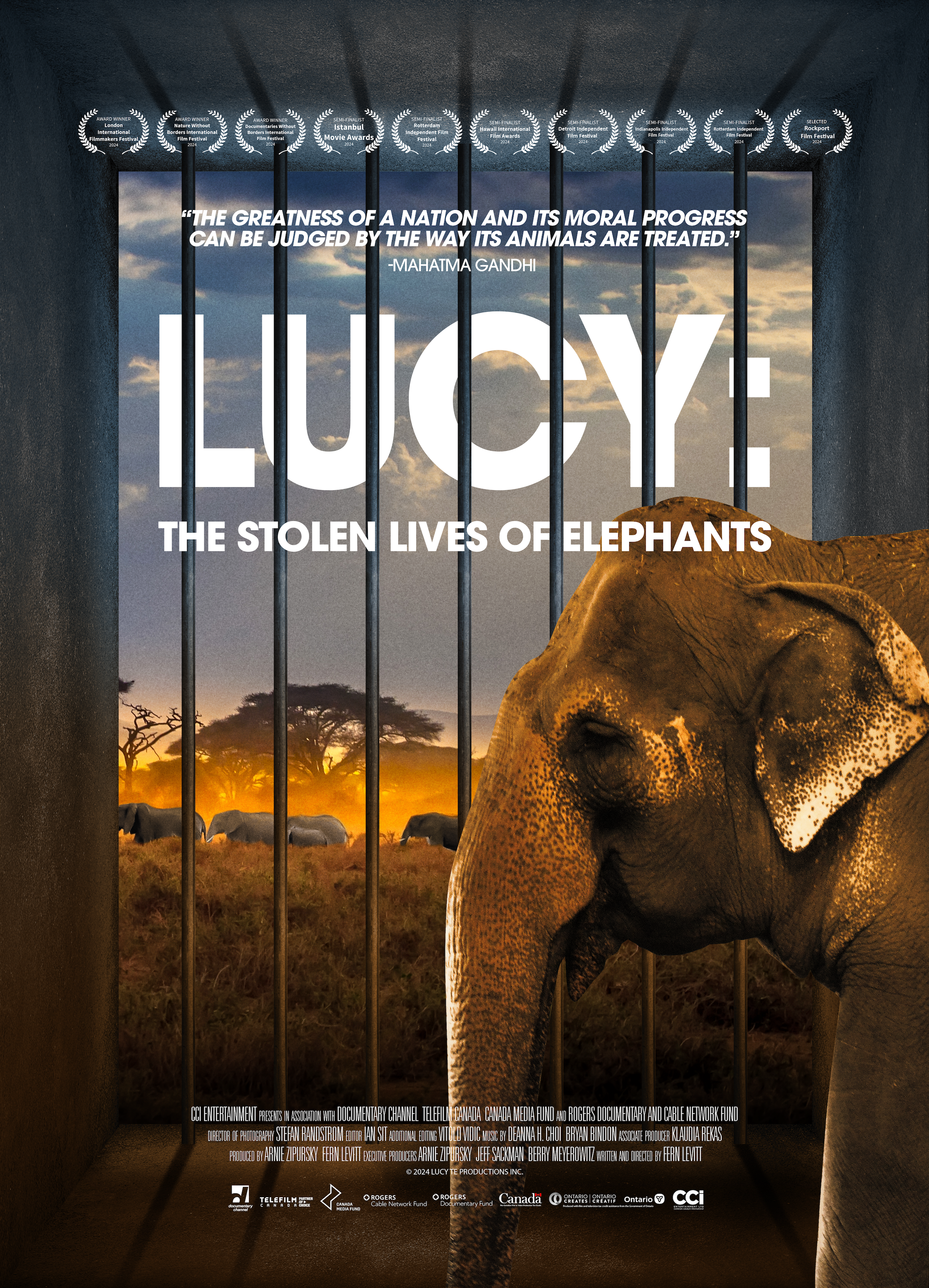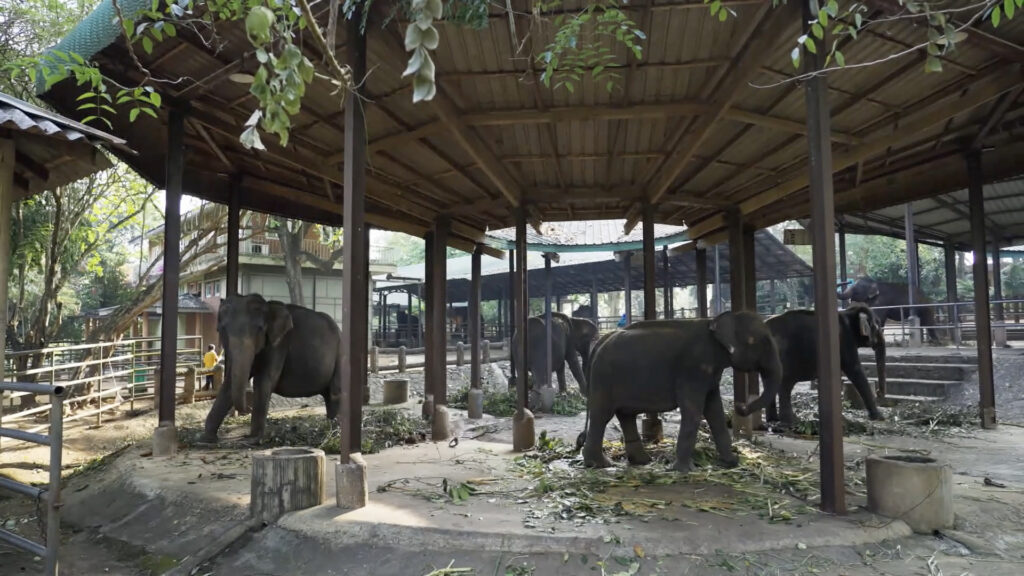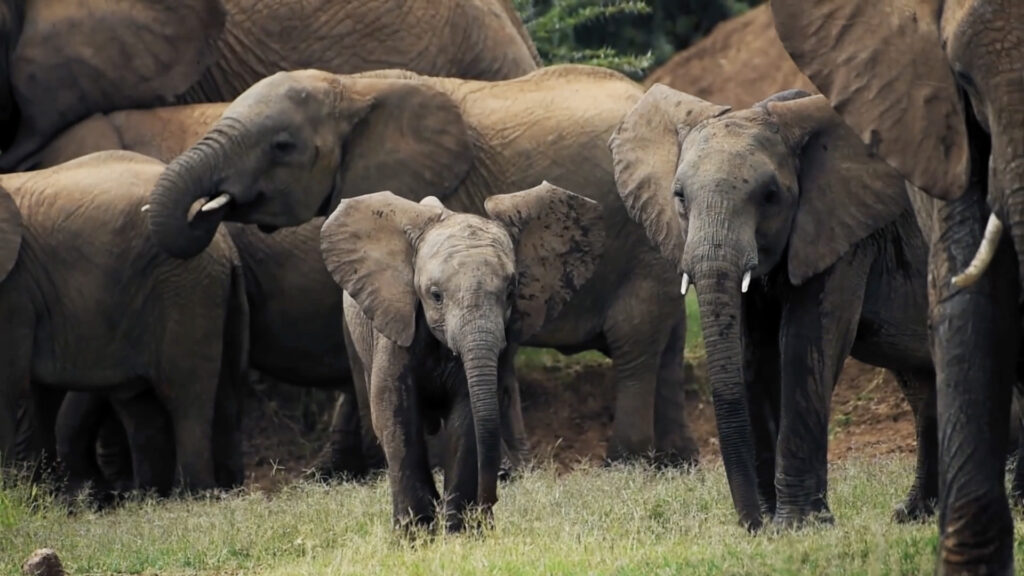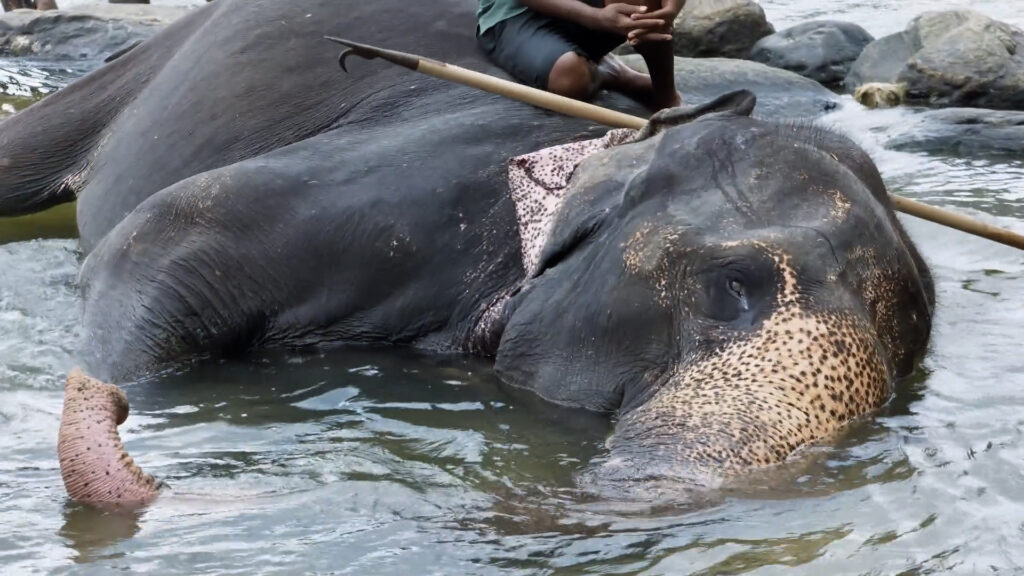Do you like elephants? Lots of people LOVE elephants because they’re BIG. Elephants have the easy life, traveling great distances along uncharted plains, sleeping for hours and hours a day, finding all sources of food, and all the cool things they do in the wild that you don’t see at the zoo. What? You think they do some of those things at the zoo? They don’t, they SUFFER. Hey, it’s the truth. You think just because an elephant is doing a certain kind of behaviour or doing a trick on command suggests they’re smart enough to understand humans, right? WRONG. Elephants are constantly being jabbed, prodded, and even pried at by a bullhook, one of the worst torture devices I’ve seen used to control animals. An elephant never forgets, and that goes for any pain it got over the years of its miserable life in a scenic prison being observed by wide-eyed people. As you can imagine, this documentary gave me a lot to learn and remember. I don’t think I’ll ever feel the same way again. I spoke to the director Fern Levitt to learn even more and get facts engraved in my mind for years. I also learned about a poor elephant named Lucy who came from elsewhere and got both a name change AND an even worse life. Now Lucy is just struggling to continue on living and deserves better in a wide open location. Ugh, I am SO close to actually joining one of these protests outside the zoo. Here’s some more facts that just might elevate your interest in this documentary.
HNMAG: You’re an activist so naturally this is something up your alley. Do you feel a film like this will bring more attention?
Fern Levitt: First of all, let me talk about this for a bit. I’ve been doing documentaries for 25 years. This film and the other one I did about dog sledding are my first two about animals. I consider myself a journalist but after seeing the suffering of animals while making these films, and I’ve become very active in saving them now. I guess I’m a journalist and activist equally.
HNMAG: What’s upsetting is how Lucy has been treated and continues to be captive. Was there anything you discovered that you thought too uncomfortable to show in the doc?
Fern Levitt: No, no. I mean, I had to find a balance between the abuse and these animals suffer being beaten. To find a balance so that the audience will watch the film. I need to keep the audience engaged but at the same time show them what’s going on. I’m not saying all the zoos beat their elephants, it is legal in Canada to use that hook but I needed to find that balance and people needed to know the truth because we go to zoos and are told how much people love these animals and that animals are safe here, they contribute to conservation and education. None of that’s true, and that’s what I wanted people to realize. You’re going to places that abuse animals, just by keeping them in captivity is abuse in itself because they don’t belong.
HNMAG: Even though you weren’t in the zoo or near Lucy, did you get a chance to bond with her and feel a special connection?
Fern Levitt: We asked all the zoos featured in this documentary if we could interview them and let them tell their stories and talk to us. Everyone said no except Miami Zoo. I never got close to Lucy, except watching her with footage I got from other people. We went in to film and we were kicked out.
HNMAG: It sounds risky going in and then getting kicked out of the zoo. You tried it at a certain point?
Fern Levitt: We did ask Edmonton Zoo if we could film in there, film Lucy, and ask questions to the staff, they said no. We went in anyway, and undercover so we could get the footage that we needed. It actually turned out well because they didn’t know they were being filmed, or recorded. When I asked them questions, they talked about things that simply weren’t true. How wildlife is running out and that are animals are here because there is no wildlife left. They claim the elephants born in captivity don’t have the same needs as other elephants. About how they don’t need a certain amount of land and don’t need to forge for food because the zookeepers have food for them. That is not true because the food they forge in the wild keeps their highly intelligent brain active. It’s what that forging that helps them as they travel km from one land to another. Where they’re getting water, where they’re going to eat, or taking down a branch from a tree to let more sun in. When they’re in these zoos, they’re in these small places with nowhere to go and nothing to do.
Fern went on to explain that the repetitive behaviour you see elephants doing in zoos is different compared to in the wild. Courtesy of brain damage due to isolation and lack of resources. The things the zoos don’t tell you.
HNMAG: It always comes down to money.
Fern Levitt: Especially on the backs of all these animals that have just as much right as we do to live. All wild animals play a critical role in keeping our environment stable. The elephants are traveling around eating these different types of vegetation, and as they’re traveling the seeds go through their body and makes it way to the grounds, and new vegetation grows. An expert has been out there studying elephants for years. If elephants aren’t out there, forests will die. If forests die, what will happen to our planet? They’re not telling our families about that. They need to be in the wild for the planet’s sake and our sake.
HNMAG: And the undercover footage was especially risky. What methods did you go to get any of it?
Fern Levitt: It’s so easy (laughs) because when I started making documentaries 20 years ago, we had these really big cameras. But now you can basically use your phone, but our DOP’s camera looked just like a regular camera to take pictures. He had that, and I had a mic that was covered up so between the two of us, people had no idea we were filming and recording.
HNMAG: And are there other documentaries you want to do covering other animals?
Fern Levitt: I would LOVE to do more documentaries on animals and bringing education so people can understand how important it is to keep them in the wild or uncover the sled dog industry and its horrible abuse. My focus is getting as much publicity for this film as possible so that Lucy will go to sanctuary and zoos use something that doesn’t use wild animals.
She went on to explain her experience in Buenos Aires, and they shut down their zoos in 2016 due to polar bears dying from heat. The new style of zoo out there is showing wildlife and nature through the magic of 3D animation. As someone who frets over all the render time and work that goes into such material, it does my heart well to see it being put to good use and properly educating people so they don’t have to look at some captive critters. I hear the kids love animation and robotics so that kind of zoo is a better alternative.
HNMAG: Have you heard any progress regarding the Jane Goodall act?
Fern Levitt: I have to give a lot of credit to the liberal government, because they’re putting in a lot of time and money into the bills that strengthen our animal and welfare laws. They brought in the ‘Free Willy’ act which means no more dolphins and whales in captivity. We’re only 1 of 5 countries that have enacted this kind of legislation, and there’s Bill S-15 which means they will phase out great apes and elephants in Canadian zoos. No other country is doing that. The liberal government has put out this bill and hopefully with the new election, I hope the liberals get in. This will pass into law, and the elephants and great apes which are in zoos will be the last ones in this country. That’s really progressive thinking that other countries will look at Canada and realize that’s what they should be doing because it’s all over the world.
HNMAG: How did you find who to talk to for the documentary?
Fern Levitt: Well remember I’ve been doing this for 25 years, and I spend a lot of time in research. I really have to know my material, I really have to understand the science, I really have to find the storytellers who are the experts, and tell those stories. I don’t start to film until I have the strongest stories that are possible. You’ve only 95 minutes to tell this story, so I find the experts, because if I get it wrong I will be discredited and the film will be discredited, and I don’t want that to happen. I really look for the people who are experts in the field, and the people who have stories to tell. Like the story of the elephants in Africa who were taken away from Swazi land and put in zoos under the pretence that they were saving these elephants. But the zoo was taking these elephants away from the wild, saying they would be slaughtered if they didn’t. But that wasn’t true.
HNMAG: And that’s how all the assorted stock footage was found?
Fern Levitt: It takes about three years to make a film. At least for me, I look for the strongest story, I have to understand the topic I’m getting into, I look for storytellers and experts, I look for archival footage, the footage we need to use in the film, and where I’m going to film.
HNMAG: And what was it like shooting all the way out at Sri Lanka and Brazil?
Fern Levitt: We traveled quite a great deal, really. That’s a contrast, because we filmed wild elephants and that was beautiful to see them, with their herds. The heartbreaking part for me and the rest of our crew was to see these elephants in the so-called nursery in chains. Then being lead out to the public, they would take these elephants out of the so-called nursery. They’d take them down to this river so people could take pictures with them, lie on them, or wash them. Then after that, they’d lead them back in chains and chain them back up again. That was really difficult and really heartbreaking because I thought that people knew better by now and realizing it was wrong. There were so many tourists there wanting to touch them and get close to them and have an experience like they do in many other countries like Thailand. You can have a close encounter with an elephant, like my husband and kids, and I did too. We went elephant riding, and you hear that it’s a sanctuary and you get tied into that and you want to be close to these animals. But we have to put their needs above our own. If we really love them, really care about them, then we need to realize this was wrong and harmful, and that these animals shouldn’t be in chains. They ought to be wild, and free, like we want to be. Their needs are far more important than ours wanting to be close enough to touch them. We could lead perfectly wonderful lives without abusing animals and you can teach your kids all about animals in documentaries and books without getting close.
HNMAG: And you have African Lion Safari threatening to sue. Are you afraid of these other organizations going after you?
Fern Levitt: I hope they are. It was actually a really good day when we got the lawyer’s letter, I suspected that was going to happen. They had the opportunity to be interviewed, and when someone tries to sue you for putting a film out, along with suing CBC and the other funders. I knew that getting that threat of suing me would bring me publicity and that’s what I wanted. I went into this film and so did CBC with their eyes wide open because we had a commitment to tell the truth, and if someone wants to sue me, go ahead. It just shows the public that you’ve got something to hide.
…And they do.
HNMAG: The elephant birth was something else. Did you feel keeping that in was a great choice in educating?
Fern Levitt: Yes, very, critically, important. Because these elephants, the females stay together for their lives. These herds are together their entire lives, the males don’t leave until their adolescence so in the wild, the birth is celebrated. All of the elephants are there to trumpet and be there for the mother and look after the baby, all these aunts and cousins and grandmother and mother are there to raise this baby. It’s beautiful. Also since it’s such a close herd, when one of the elephants dies, they mourn the death and stay by the bones to protect them. We can relate to this if one has a family that cares deeply for them. We wanted to show the contrast of what happens when an elephant gives birth in a zoo. That was the heartbreaking part for me, it was hard for me to watch, harder than watching the elephants getting beaten with the bull hook.
HNMAG: Besides all of the controversial stuff, was there anything that fascinated you?
Fern Levitt: I just loved watching them in the wild, witnessing the baby bonding with the mother. I felt really honoured to be there, and we were a safe distance from them. The heartbreak for me, really, there were a lot of parts that broke my heart, but the really heartbreaking part for me was in Sri Lanka, when I saw these hundreds of tourists that were there from Europe and other countries watching these elephants come down in chains to the river. And not question whether that was cruel or not, or maybe they didn’t feel the need to question it. Maybe the need to be close to an elephant outweighed how cruel this was. That was shocking, I really thought we knew better.
I agreed with her on that as we talked further about a chained mother not being able to see her baby and checking on its health. So much for bonding, which is more justifiable in my opinion. This was so much of a nerve-wracking subject for us to discuss especially with how my generation doesn’t care. I’ve never really enjoyed zoos myself but I can certainly say I dislike them more than I do now, which I didn’t think was possible, but its amazing how unexpected things can happen.
Toronto Zoo is transitioning to something to the Buenos Aires model. So let’s some more follow suit. Even more so, let’s hike our way to the movie theatres to watch Lucy: The Stolen Lives of Elephants so we can learn even more about how elephants treated in this country compared to their home country. And vice versa. It’s in select theatres now, don’t forget to find one near you. We gotta keep the people informed, AND the elephants alive!




